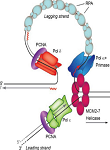|
|
|
EDITORIAL: Targeting DNA repair as cancer therapy: TLS comes into focus
|
|
|
|
|
|
|
|
|
|

|
|
|
|
Jia Zhou, Ph.D.
|
|
|
|
Dana-Farber Cancer Institute
|
|
Department of Radiation Oncology, DFCI, Harvard Medical School, MA, 02115, USA.
|
|
jia_zhou@dfci.harvard.edu
|
|
|
|
|
|
|
|
|
|

|
|
DNA repair plays critical roles in maintaining genome stability. There are six major DNA repair pathways that handle different types of DNA damages, namely base excision repair (BER), nucleotide excision repair (NER), mis-match repair (MMR), homologous recombination repair (HR), non-homologous end joining (NHEJ), and translesion synthesis (TLS). Numerous studies have shown that alteration in DNA repair genes, including deletions, mutations, and copy number alterations, and altered gene expression, is one of the major causes of mutagenesis and cancer. In fact, cancer cells are often defective in one of their six major DNA repair pathways. For example, approximately half of the epithelial ovarian cancers have alterations in genes that regulate HR, which accounts for their genomic instability and thus aggressiveness. The cancer risk dramatically increases in the population who carry mutations in HR genes, including the well-known breast cancer susceptibility genes (BRCA1 and BRCA2).
|
|
|
|
|
|
|
|

|
|